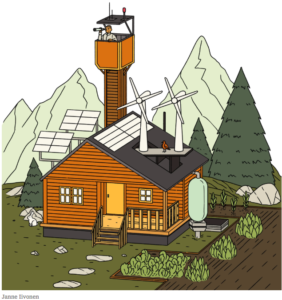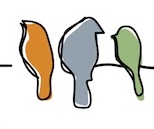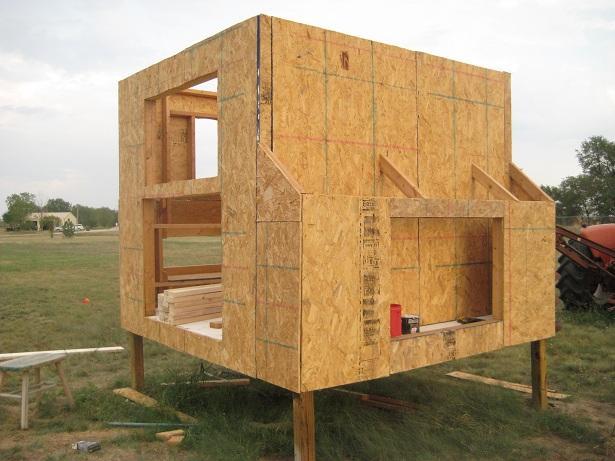Author Archives: Michael
Investing in climate change insurance? Try community resiliency
A recent article in New York Times… 
Climate Change Insurance: Buy Land Somewhere Else
In case global warming makes their homes uninhabitable, some millennials have a Plan B: investing in places like the Catskills, Oregon and Vermont.
Buried among several examples of people who think the answer to large-scale catastrophe is striking out on their own is the following gem…
Bruce Riordan, program director for the Climate Readiness Institute at the University of California Berkeley, cautioned that it isn’t realistic to expect to live in a bubble. “Sure, you can grow your own vegetables, but what about wheat and grains?” he said. “And what happens when you need medical attention?”
Mastering surgery would certainly be a lot harder than learning to grow tomatoes.
A better strategy, Mr. Riordan suggested, would be to find a community that is intelligently preparing for whatever climate change may bring. He equated the situation to what California has done about earthquakes: They can’t be avoided, but we can build safer buildings, get better at predicting them and establish systems to care for vulnerable populations when they occur.
This jibes with Front Porch Forum‘s experience. When disaster strikes, the most resilient communities are those full of neighbors who know each other, know what’s going on, and who have a record of helping each other and accomplishing things together.
Our disconnects in values, relationships and social fabric
danah boyd was quoted on Wired yesterday…
“[W]e have a cultural problem, one that is shaped by disconnects in values, relationships, and social fabric. Our media, our tools, and our politics are being leveraged to help breed polarization by countless actors who can leverage these systems for personal, economic, and ideological gain.”
She went on to state “How do you reknit society? Society is produced by the social connections that are knit together. The stronger those networks, the stronger the society. We have to make a concerted effort to create social ties, social relationships, social networks in the classic sense that allow for strategic bridges across the polis so that people can see themselves as one.”
“Part of what is really collapsing here is that the networks have become too fragmented and too polarized. Technology doesn’t help; it simply magnifies the poles. This is dangerous and cyclical. Polarization leads to distrust and tribalism which leads to more polarization. So for me, the path forward, which requires business and the public sector and civil society working together, is about reconstructing the networks of America.”
In our own small way, this is Front Porch Forum‘s work… helping neighbors connect and build community… reconstructing networks of neighbors across political, class, racial and other boundaries.
Next-door strangers… why helping neighbors connect with each other is vital
If you’re interested in Front Porch Forum’s work, take a look at this new article by Marc J. Dunkelman published by the Institute for Advanced Studies in Culture… Next-Door Strangers: The Crisis of Urban Anonymity…
The British anthropologist Robin Dunbar spent years researching isolated societies, both past and present. He discovered a remarkable similarity across geography and context. Human societies, he found, naturally sort themselves across three distinct levels of intimacy. The first, and most intimate, Dunbar labeled bands. These are the people who sleep together in overnight camps and know one another intimately. They rarely number more than a few dozen together. At the other end of the intimacy spectrum are tribes, groupings that live under the broadest and thinnest common banner. Fellow tribe members may share in certain rituals and traditions, but they rarely know one another personally.
Situated squarely between bands and tribes are what Dunbar termed villages. A village, generally speaking, marks a collection of bands, and groups of villages constitute a tribe. Correspondingly, fellow villagers are rarely as intimate with one another as they are with fellow members of their band, but they are more intimate than they would be with outside members of their tribe. Villagers do not necessarily know one another personally but they are often able to converse about something specific. They’d know if someone’s mother were ill, or if their child had achieved an outstanding feat. Upon seeing one another, their conversation would flow from a common frame of reference.
What held the American community together through its first four migrations was a very specific and shared sociological architecture. Colonial villages, frontier towns, urban tenements, and even some first-ring suburbs were classic examples of Dunbarian villages in that they were suffused by familiar, but non-intimate, relationships. The vicissitudes of ordinary life made it almost inevitable that people who lived near one another would be socially connected. It wasn’t just, as Alexis de Tocqueville wrote in the 1830s, that Americans were unusually likely to join voluntary associations. The demands of democratic government the fact that power flowed up from the grassroots prompted similarly situated strangers to get to know one another in pursuit of the common good.
Today’s reinvigorated cities boast much of what made urban America so vibrant during its heyday. The cultural amenities, the coffeehouse culture, the vast diversity, and even the convenience of public transit have emerged in places for which, in the mid-1970s, conventional wisdom predicted continued decline. But one feature distinguishes today’s urban meccas from those of eras past. The core sociological building block that Jane Jacobs celebrated in The Death and Life of Great American Cities the Dunbarian village instantiated in an urban neighborhood has all but collapsed.
FPF helps neighbors connect and build community. We accomplish that by hosting a statewide network of online neighborhood forums designed specifically to increase social capital among neighbors. About half of Vermont households participate on their local FPF. Learn more here.
FPF Hiring Ruby on Rails Developer
Front Porch Forum is hiring! We are seeking a Ruby on Rails Developer to join our team. This position is full-time and based in Burlington, Vermont. Be part of a world-class team of software engineers, and help us fulfill our community-building mission. Check out the details and apply here.
Decline of open web in favor of social media… “grim consequences”
Iran’s “Blogfather,” Hossein Derakhshan, in a recent interview on the NiemanStoryboard…
 “The decline of the web in favor of social media entails grim consequences. Hyperlinks were the founding principle of the web; it secured a diversity, nonlinearity, decentralization and interactivity, which made the web so powerful. But social media’s very philosophy and monetization strategy, or the stream, cannot be friendly to hyperlinks, since they do not want their users to leave their space. This new environment, in addition to the currently dominant algorithms, which favors popularity and now-ness rather than diversity and quality, is worse than television in its potential damage to representative democratic societies, where majority is supposed to take informed decisions without jeopardizing minorities. The rise of identity politics and intolerance for diversity is directly linked to the current form of the internet. This is the deepest shock of this transition to me since my release. This shift from what I call books-internet to TV-internet.”
“The decline of the web in favor of social media entails grim consequences. Hyperlinks were the founding principle of the web; it secured a diversity, nonlinearity, decentralization and interactivity, which made the web so powerful. But social media’s very philosophy and monetization strategy, or the stream, cannot be friendly to hyperlinks, since they do not want their users to leave their space. This new environment, in addition to the currently dominant algorithms, which favors popularity and now-ness rather than diversity and quality, is worse than television in its potential damage to representative democratic societies, where majority is supposed to take informed decisions without jeopardizing minorities. The rise of identity politics and intolerance for diversity is directly linked to the current form of the internet. This is the deepest shock of this transition to me since my release. This shift from what I call books-internet to TV-internet.”
Unlike some other social media platforms, Front Porch Forum doesn’t aim to lure people in and hold their attention 24/7. FPF, for many Vermonters, is a 10-minute-a-day habit that leads to more face-to-face conversations with neighbors… and to friendlier, more informed, and more resilient local communities. Hyperlinks in FPF postings are an important part of that.
FPF is hiring… Online Community Manager
 Do you love helping neighbors connect? Do you value a strong sense of community among neighbors?
Do you love helping neighbors connect? Do you value a strong sense of community among neighbors?
Front Porch Forum is looking to hire a reliable, organized, and self-motivated addition to our highly collaborative Vermont-based team.
Learn more today and apply by March 24, 2017.
Front Porch Forum folks give wonderful send-off to Morrisville couple
 “Thank you Front Porch Forum folks… you have made Ellen’s day… so great to see my wife so blessed enjoying so many of you stopping by today to say goodbye. Thanks for a great 22 years in Morrisville. We will miss all the wonderful people in this great town.”
“Thank you Front Porch Forum folks… you have made Ellen’s day… so great to see my wife so blessed enjoying so many of you stopping by today to say goodbye. Thanks for a great 22 years in Morrisville. We will miss all the wonderful people in this great town.”
– Philip, Morrisville
Know someone moving to or from your town? Organize a welcome or going-away party on your neighborhood FPF!
About Blog
Ghost of Midnight is an online journal about fostering community within neighborhoods, with a special focus on Front Porch Forum (FPF). My wife, Valerie, and I founded FPF in 2006... read more
Post Categories
- Uncategorized
- PDF2009
- Calendar
- Northeast Kingdom
- podcast
- Peer Rental
- Localization
- Big Tech
- Events
- PDF2007
- Web Traffic
- Google AdSense
- Pay It Forward
- Elections
- berkmansunlight
- Maps
- Video
- Upstate New York
- Coupons
- Wildlife
- Mobile
- Viral Marketing
- Raffle
- Crisis Response
- Donations
- Lost & Found
- Real Estate
- College Students
- Gratitude
- Social Responsibility
- Orton Family Foundation
- Start ups
- Make It Your Own Awards
- Online Civility
- Clay Shirky
- Newspapers
- Humor
- How To Use FPF
- Online Classified Ads
- Peer Reviews
- Best of FPF
- Politics
- Community Management
- Economic Development
- Local Reviews
- Case Foundation
- Borrow and Lend
- Neighborhood Watch
- Good Government
- Small Business Advertising
- Citizen Journalism
- e-Vermont
- Democracy
- Local Search
- Knight Foundation
- Burlington
- MacArthur Fellows
- Civic Engagement
- Social Media
- social capital
- Social Networking
- Vermont
- Neighborhood
- Community Building
- Local Online
- Front Porch Forum

 “On April 27, my 13-year-old was attacked just before 6 p.m. by a man with a folding pocketknife on the bike path near the train trestle between North Beach and Leddy Park. The man demanded my son hand over his bike and his wallet. Although my son was fortunate enough to get away with both his bike and his wallet, the man slashed him with the knife on his face and his shoulder. The cuts were superficial, but the whole event was incredibly frightening. Please take care on the bike path!”
“On April 27, my 13-year-old was attacked just before 6 p.m. by a man with a folding pocketknife on the bike path near the train trestle between North Beach and Leddy Park. The man demanded my son hand over his bike and his wallet. Although my son was fortunate enough to get away with both his bike and his wallet, the man slashed him with the knife on his face and his shoulder. The cuts were superficial, but the whole event was incredibly frightening. Please take care on the bike path!” “Posting for a friend: She had a chicken coop stolen off her property in Hinesburg Wednesday afternoon about 3-4:30. Blue Chevy pick up headed towards Bristol with 3 people 2 males and 1 female. If you saw them or have any information please contact Hinesburg Police. I don’t have a photo of the coop but it’s big, stands on 4 legs, has window on side and long one on back to get eggs out. No siding on it yet just plywood on sides. Its about 6 feet by 4 feet.”
“Posting for a friend: She had a chicken coop stolen off her property in Hinesburg Wednesday afternoon about 3-4:30. Blue Chevy pick up headed towards Bristol with 3 people 2 males and 1 female. If you saw them or have any information please contact Hinesburg Police. I don’t have a photo of the coop but it’s big, stands on 4 legs, has window on side and long one on back to get eggs out. No siding on it yet just plywood on sides. Its about 6 feet by 4 feet.”